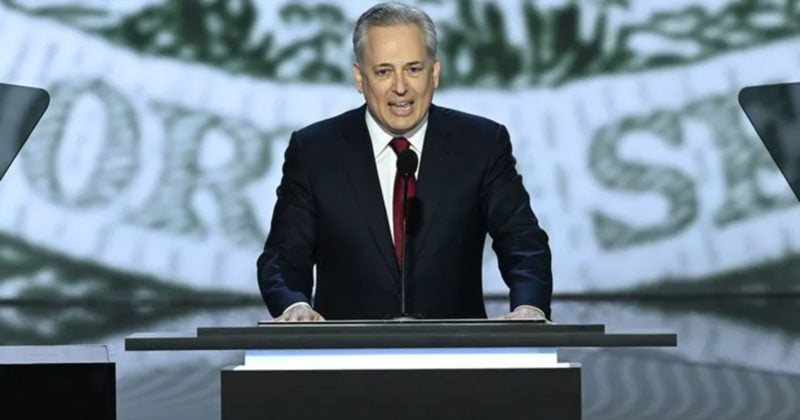
Photo: Ricky Carioti/The Washington Post
Who is David Sacks? Trump’s pick for White House AI and Crypto Czar is a Bitcoin holder
David Sacks will spearhead efforts shaping the future of crypto regulations and online free speech protections.
President-elect Donald Trump has nominated David Sacks as his White House AI and Crypto Czar. Who is David Sacks and what is his stance on Bitcoin and crypto?
Who is David Sacks?
David Sacks is a South African-American entrepreneur and investor recognized for his influential roles in the tech industry. He was born in Cape Town, South Africa, into a Jewish family and relocated to the US at the age of five, where his family established roots in Tennessee.
Growing up, Sacks was inspired by his grandfather, who started a candy factory in the 1920s. Although he did not initially aspire to be an entrepreneur—preferring not to follow in his father’s footsteps as an endocrinologist—his family’s entrepreneurial legacy influenced his career path.
He attended Memphis University School before pursuing higher education at Stanford University, where he earned a Bachelor of Arts in Economics in 1994. He later obtained a Juris Doctor from the University of Chicago Law School in 1998.
In 1999, Sacks joined PayPal as its first product leader and later became the company’s Chief Operating Officer. He played a key role in transforming PayPal into a global leader in online payments.
Following PayPal’s acquisition by eBay in late 2002, Sacks founded Yammer, a social networking platform for businesses that was acquired by Microsoft.
In 2017, he co-founded Craft Ventures. The venture capital firm has invested in numerous successful technology firms like SpaceX, Uber, Airbnb, BitGo, and Reddit, to name a few. As of November 2023, Craft Ventures’ assets under management grew to $3.3 billion.
Apart from his achievements at Craft Ventures, the Silicon Valley entrepreneur is also known for co-hosting the “All-In” podcast alongside other prominent venture capitalists. The podcast discusses various topics related to technology, politics, and economics.
A close friend of Elon Musk
David Sacks and Elon Musk share a close relationship rooted in their involvement in PayPal’s early development. After leaving the company, both became successful entrepreneurs and continued to work together on various ventures.
They are part of the so-called “PayPal Mafia,” a network of influential tech entrepreneurs who worked together in the early 2000s and have since gone on to create successful tech companies.
The venture capitalist played an important role in Musk’s acquisition of Twitter (now X). Sacks provided funding for the $44 billion deal and served as a trusted advisor during the ownership transition, according to the NYT.
Sacks is also known for his political contributions, particularly for his support of Florida Governor Ron DeSantis, a pro-Bitcoin politician and an anti-CBDC.
A Trump supporter
Sacks has positioned himself as a strong advocate for Trump’s return to the presidency. His perspective is that Trump’s policies are better suited to meeting the challenges facing the nation. In comparison, he feels the Biden administration has struggled to provide compelling alternatives.
The entrepreneur has been vocal in his criticism of the current administration’s policies, particularly regarding key issues such as the economy, foreign policy, and border security. He believes that under Donald Trump’s leadership, America can regain prosperity, security, and stability.
On December 5, Trump officially appointed Sacks as White House AI and Crypto Czar.
He is expected to guide the administration’s policies on AI and crypto—areas deemed critical to American competitiveness. The focus would be on creating a legal framework that provides clarity for the crypto industry.
Trump stated that Sacks would work to safeguard free speech online and help build regulatory frameworks for the crypto industry.
And a Bitcoin investor
Sacks has long been a supporter of crypto assets like Bitcoin and Ethereum, viewing them as embodiments of the original vision behind PayPal—establishing a “database of money” where transactions remain within a secure digital ecosystem.
He has observed Bitcoin’s evolution from a niche asset to a more mainstream investment opportunity, and has invested in the flagship crypto asset.
“I’ve been interested in Bitcoin since I think I first bought it in 2012. We did express a thesis back in 2017, 2018 that we thought that crypto would graduate into being an institutional asset class and being really more of consumer retail phenomenon,” Sacks said during an interview with Anthony Pompliano.
“So we ended up investing in institutional custody through a company called BitGo and we also invested in Multicoin, a crypto-focused hedge fund,” he added. “We basically believe that as crypto matures into an asset class, you would need specialized fund managers.”
Sacks believes that the transformational part of Bitcoin is its potential ability to function as non-fiat money.
With the risks associated with government-controlled currencies, particularly regarding currency debasement due to excessive money printing, he thinks Bitcoin offers the possibility of a financial system independent of government control.
“There is a huge risk of currency debasement when the government is in control and particularly when you have the world’s reserve currency. There’s just such an enormous temptation to print money to finance your budget and to rack up loans that become unpayable,” said the VC.
“What Bitcoin offers is a different kind of currency where it’s not backed by a government; it’s backed by math; it’s backed by encryption. You don’t have to trust the government. There will only be 21 million BTC. You just have to trust that Bitcoin effectively won’t be cracked,” he stated.
While Sacks believes that Bitcoin has the strongest case among crypto assets, he acknowledges other technological advancements that have emerged alongside it, such as blockchain technology and decentralized finance.
